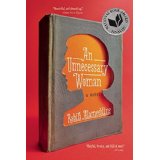It’s a Christmas scene outside my window. Snow. Sun. A lovely moment. It doesn’t help. I still feel sad. Tony Martin singing in the next room doesn’t
help either.
I’ve tried three times in the past week to find a perfect
Christmas tree. I knew what I wanted—a
bare tree, not fake green anywhere, just sweet Led lights at the tips of its leafless branches, my
twenty-year-old dried pomegranates swinging in all their maroon grandeur inside
the web of light. It would be small enough to not overwhelm our living room,
cheerful enough to greet the several sets of friends and family who would be
visiting.
It did not exist at any of the local stores I visited. I resorted to online sites, clicking through
hundreds, maybe thousands of pictures of every kind of tree one could imagine,
even several which would stand up-side-down in a tree yoga pose for the season,
don’t ask me why. Then I found it. Bare branches, little lights, just the right size,
almost the right price, but close enough.
The box came a week later.
I love to decorate for Christmas and my husband doesn’t. But this tree
would be simple, easy, not involving the two large containers filled with gold
balls and chains and strings of lights stuffed at the bottom of the storage
cage in our condo’s lower floor. Only an
electric outlet.
We would plug it in on Saturday night, and celebrate the season
and the tree with martinis after the arduous task of taking it out of its
box. Christmas carols floating around
us, olives floating in our glasses, I, butcher knife in hand, ripped open the
box, pulled out the packing, and found nestled in puce-green tissue, three
ugly, red, metal, containers: Baskets, the tags said. Disaster,
I said, wanting to either cry or say a very bad word. I did both.
The red things are still in our bedroom waiting for the
Return Label promised a week ago so that I can send them back to wherever they
came from. I returned to the computer,
this time searched Amazon’s offerings, vaguely aware that they sold things
other than my books. And, yes! Another tree, even better than the first,
cheaper, at least. I ordered it and was
promised two-day delivery. That would
have been today. I moved furniture to
make room for it, found the old pomegranates.
Got ready.
Then it snowed. Everywhere. Apparently even where this tree has been
waiting for us. An email informed me
late last night that its journey has been delayed because of bad weather. Sorry,
they said. I didn’t respond. One cannot swear at Mother Nature, can she?
So, I’m sitting at the window, watching bundles with legs
sliding their dogs in the park below me and an occasional car creep along shiny
asphalt. And once I convince myself that
a tree does not a Christmas make, I’ll put on my puffy jacket and cap and head
out for the figs I need for figgy pudding.
My family loves figgy pudding at Christmas, but we all know that pudding
does not make Christmas either. Love does, and we have lots of that, no matter
what the weather is.




 On The Rebound is a sweet, sports romance set on the campus of fictional Irving University. It's a story about second chances and features a women's college basketball team. Here's a teaser for you.
After he's caught in a grade fixing scandal, men’s college basketball coach Greg Miller is thrown a lifeline when an old friend offers him a job with the small-school Irving University women’s team.
Academic Advisor Ciara Monaghan knows first-hand the heartbreak and havoc a cheating man can wreak. She wants nothing more than to protect the University's reputation by seeing to it that Greg’s stay at Irving is short.
The last thing either of them wants is the attraction they can’t deny. Can a struggling member of the basketball team bring them together to see how wonderful a second chance at life, and love, can be?
On The Rebound is a sweet, sports romance set on the campus of fictional Irving University. It's a story about second chances and features a women's college basketball team. Here's a teaser for you.
After he's caught in a grade fixing scandal, men’s college basketball coach Greg Miller is thrown a lifeline when an old friend offers him a job with the small-school Irving University women’s team.
Academic Advisor Ciara Monaghan knows first-hand the heartbreak and havoc a cheating man can wreak. She wants nothing more than to protect the University's reputation by seeing to it that Greg’s stay at Irving is short.
The last thing either of them wants is the attraction they can’t deny. Can a struggling member of the basketball team bring them together to see how wonderful a second chance at life, and love, can be?
 Jim Cangany was forty pages into his first manuscript when he realized it was a romance. He went with it and has great joy writing sweet, contemporary love stories. A lover of things that go fast, when Jim’s not writing, you can probably find him checking into the latest from IndyCar or pro bike racing. He lives in Indianapolis with his saint of a wife Nancy, his sons Seamus and Aidan, and the princess of the house, kitty cat Maria.
Visit him:
Jim Cangany was forty pages into his first manuscript when he realized it was a romance. He went with it and has great joy writing sweet, contemporary love stories. A lover of things that go fast, when Jim’s not writing, you can probably find him checking into the latest from IndyCar or pro bike racing. He lives in Indianapolis with his saint of a wife Nancy, his sons Seamus and Aidan, and the princess of the house, kitty cat Maria.
Visit him: 

